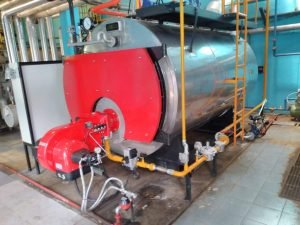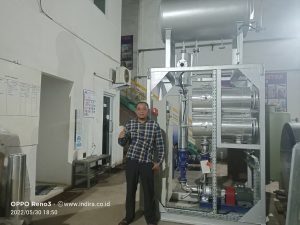IDM Boiler Types of Fire Tube Boilers
Technological progress has significantly impacted human activities, especially in the industrial sector. Various kinds of technological developments are carried out to facilitate human performance, so at this time there are many types of industrial tools that have the same purpose but have different ways of working, including boilers. After the previous post, we discussed the definition of a boiler and its main parts, this time we will try to review the types of boilers and their advantages and disadvantages


What is a boiler?
The boiler is a closed vessel-shaped device that is used to heat water to produce steam (steam), the heat from the combustion of fuel in the boiler will be transferred to the water medium flowing in the pipes, when the water temperature has reached a certain temperature it will occur evaporation. So we can interpret that a boiler is a tool used to make steam, as we know steam can be used to drive a turbine in a power plant and function as a temperature controller in a petroleum distillation column.
Before we discuss further boiler technology at this time, it would be nice if we first knew the type of boiler that was first used. This boiler is called a Pot Boiler or Hycock Boiler which has the simplest form in history and was first introduced in the 18th century. This boiler has a large volume of water but can only produce steam at low pressure, using wood and coal as fuel. that’s a little explanation of the ancient boiler that was successful in its time.
Boiler Types
Boiler types can be distinguished from various things such as characteristics, working methods, pipe type, and the fuel used. Each type of boiler has its advantages and disadvantages, as we have described below:
Boiler Type Based on Tube-Type (Pipe):
This boiler has two parts in it, namely the tube section which is where the combustion occurs, and the barrel/barrel which contains the fluid. This type of fire tube boiler has the characteristics of producing a low amount of steam and limited capacity.
Working Principle: The ignition process occurs in the pipe and the heat generated is delivered directly into the boiler filled with water.
Pros: The installation process is quite easy and does not require special settings, does not require a large area, and has a low cost.
Disadvantages: Has a combustion chamber that is difficult to reach when cleaning, has a low steam capacity, and is less efficient because a lot of heat is wasted.
Has a construction that is almost the same as the type of fire pipe, this type also consists of a pipe and a barrel, the only difference being that the side of the pipe is filled with water while the side of the barrel is where the combustion takes place. The characteristic of this type is that it produces a relatively large amount of steam.
Working Principle: The ignition process occurs on the outside of the pipe, so the heat will be absorbed by the water flowing in the pipe.
Pros: It has a large steam capacity, and a relatively higher efficiency value, and the furnace is easy to reach when cleaning.
Disadvantages: The initial investment cost is quite expensive, requires a large area, and requires additional components in terms of water treatment.
By Type of Fuel
This type of boiler uses solid fuels such as wood, and coal, with characteristics such as relatively cheaper fuel prices and more efficiency when compared to electric boilers.
Working Principle: Heating comes from the combustion of solid fuels or it can be a mixture of several solid fuels (coal and wood) assisted by oxygen.
Pros: Fuel is easy to obtain and cheaper.
Disadvantages: Burning residue is difficult to clean.
Oil Fuel (Oil Fuel)
This type has fuel from the petroleum fraction, with the characteristics of having more expensive combustion raw materials, but has a better efficiency value when compared to the others.
Working Principle: Heating from the combustion of a mixture of liquid fuels (kerosene, diesel, residue) with oxygen and a heat source.
Pros: It has little combustion residue so it is easy to clean and the raw materials are easy to get.
Disadvantages: It has expensive raw material prices and has an expensive construction.
Gas Fuel (Gaseous Fuel)
Has a type of gas fuel with the characteristics of cheaper raw materials and better efficiency values when compared to other types of fuel.
Working Principle: Combustion that occurs due to a mixture of gas fuel (LNG) with
Workshop
Kawasan Pergudangan Laksana Business Park, Jalan Laksana 6 Blok F 09, Desa laksana Kec. Pakuhaji, Kab. Tangerang, Banten- 15570
PT Indira Mitra Boiler
Ratman Bejo
☎️081388666204
My Website
https://indira.co.id
Email: info@indira.co.id
Email: idmratman@gmail.com
https://www.youtube.com/@Ratman_Bejo/videos